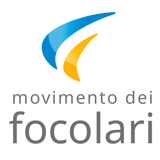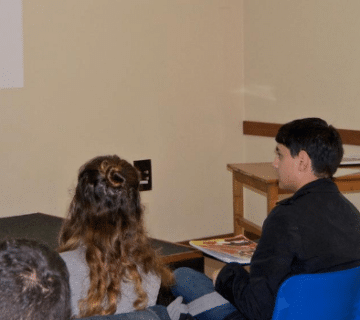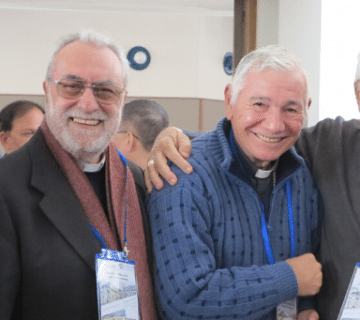 In North America, EoC businesses include, among others, an environmental engineering firm, a violin atelier, a language school, a travel agency, a tutoring service, a law office, an organic farm and various consulting businesses. These EoC firms sustain their vision through contact with local Focolare communities and their “business to business” network with other EoC firms throughout the continent and the world. Quarterly conference calls, an annual national convention and occasional international meetings provide opportunities to sustain their commitment to the project and refine their ideas.
In North America, EoC businesses include, among others, an environmental engineering firm, a violin atelier, a language school, a travel agency, a tutoring service, a law office, an organic farm and various consulting businesses. These EoC firms sustain their vision through contact with local Focolare communities and their “business to business” network with other EoC firms throughout the continent and the world. Quarterly conference calls, an annual national convention and occasional international meetings provide opportunities to sustain their commitment to the project and refine their ideas.
Clare Marie DuMontier’s Visitation Law Office in Appleton, Wisconsin, provides guardianship services for the elderly. She had considered leaving the profession because of the conflict that suffused the legal environments in which she had worked. A spirituality of unity has given her the tools “to stay calm and persevere, and to love in the most stressful circumstances.”
The businesses commit themselves to infusing all their relationships — with employees, customers, suppliers and their neighbors — with values of love and respect.
But how do EoC businesses function in a competitive environment?
John Mundell is the founder and CEO of Mundell & Associates, an environmental reclamation consulting firm in Indianapolis.
“It’s a twist on the American way, but in an EoC business, we try to see competitors not as the ones to beat, but as people with whom we can build relationships. Since we started, we have tried to follow the principle of never speaking ill of a competitor. It’s tempting when someone calls seeking negative information about them, but we refrain. We compete only by the quality of our product and our service.
Once we were involved in a fairly large bid for a sophisticated project in another state. When the attorney for the city stood up to say how our references checked out, he confessed that he had spoken not only with our client referrals, but also with our competitors. ‘I tried to get the dirt on this company, and I have never heard such glowing remarks from competitors. I have no reservations about hiring these people.’”
EoC businesses also consider how to foster reciprocal relationships in their local environments. For example, Mundell decided to relocate their offices so as to encourage economic development in a distressed part of the city.
“We decided to hire local people to fix the roof and do the landscaping. We have developed close relationships with the local businesses. Our employees volunteer at the food pantry in the nearby Disciples of Christ church, and some helped to fix up a run-down house in our neighborhood. A television crew came by that day, and they featured us on the evening news. Because of that coverage, three years later we obtained a $50,000 contract.”
Some of the more developed EoC businesses have been able to offer internship programs so that undergraduate and graduate students can experience from the inside how these firms operate. Elizabeth Garlow, who had done research on the EoC model in college, interned with Mundell & Associates. “I came away,” she affirms, “convinced that you can build a sense of family in a workplace.”
From Focolare: Living a Spirituality of Unity in the United States (New City Press, 2011).


 English
English Español
Español Français
Français Português
Português


